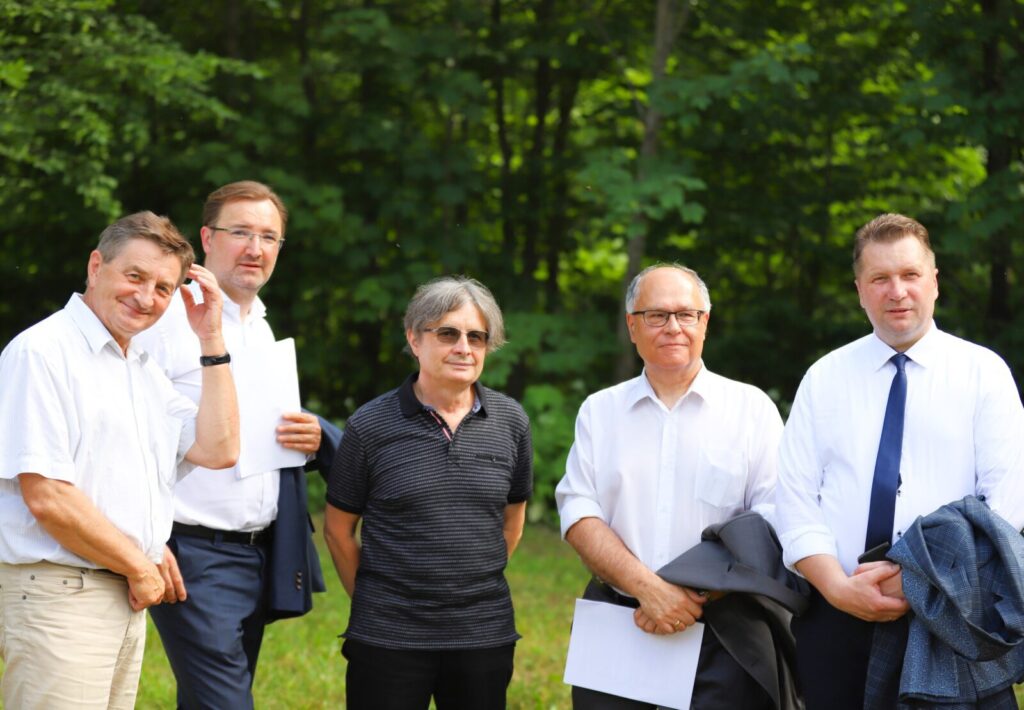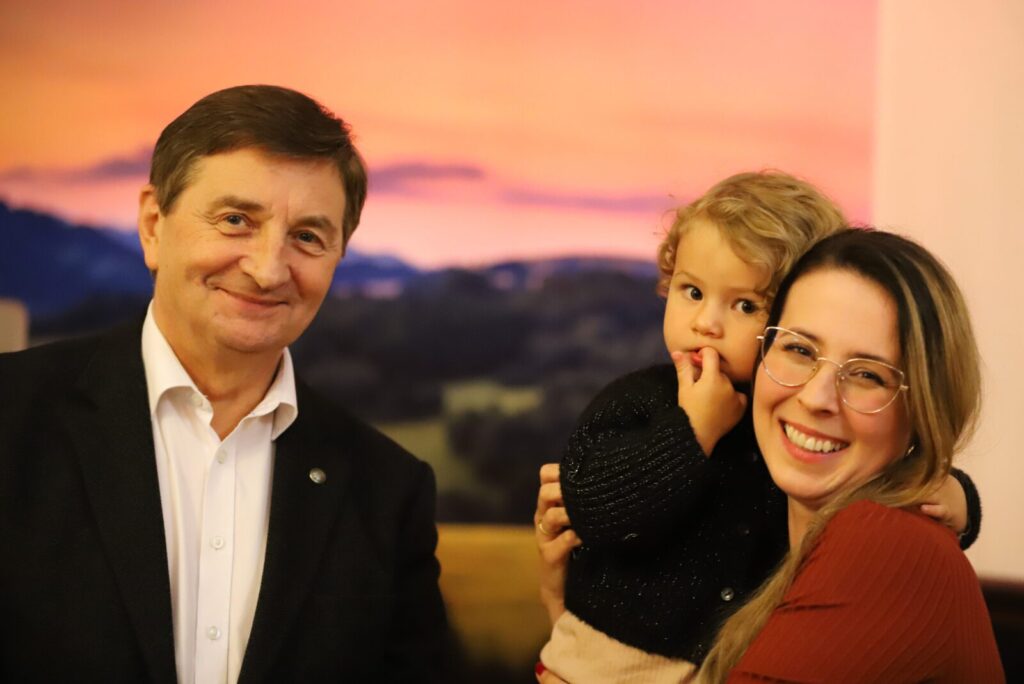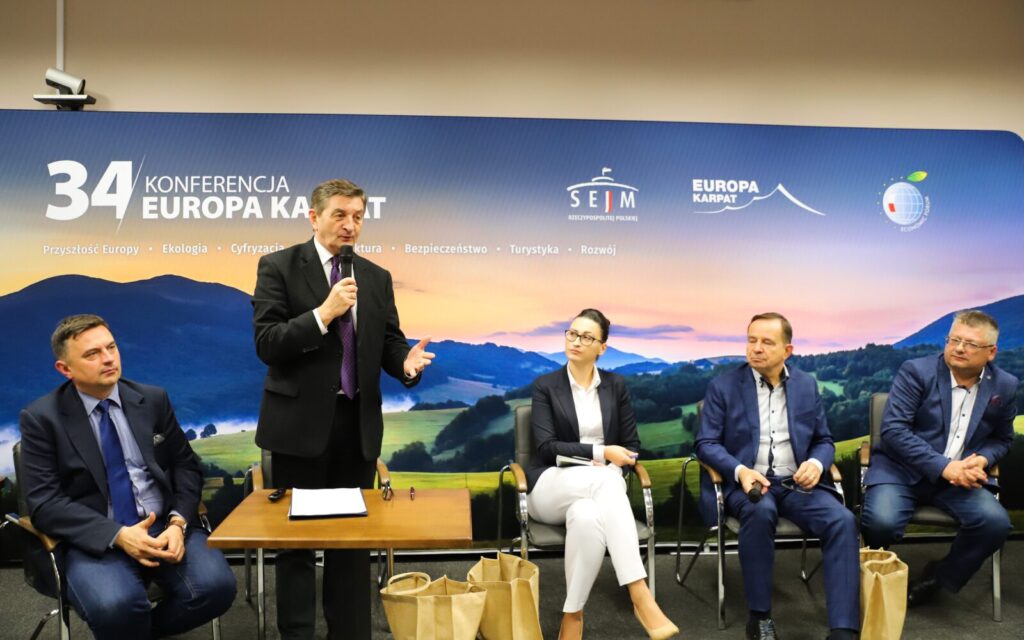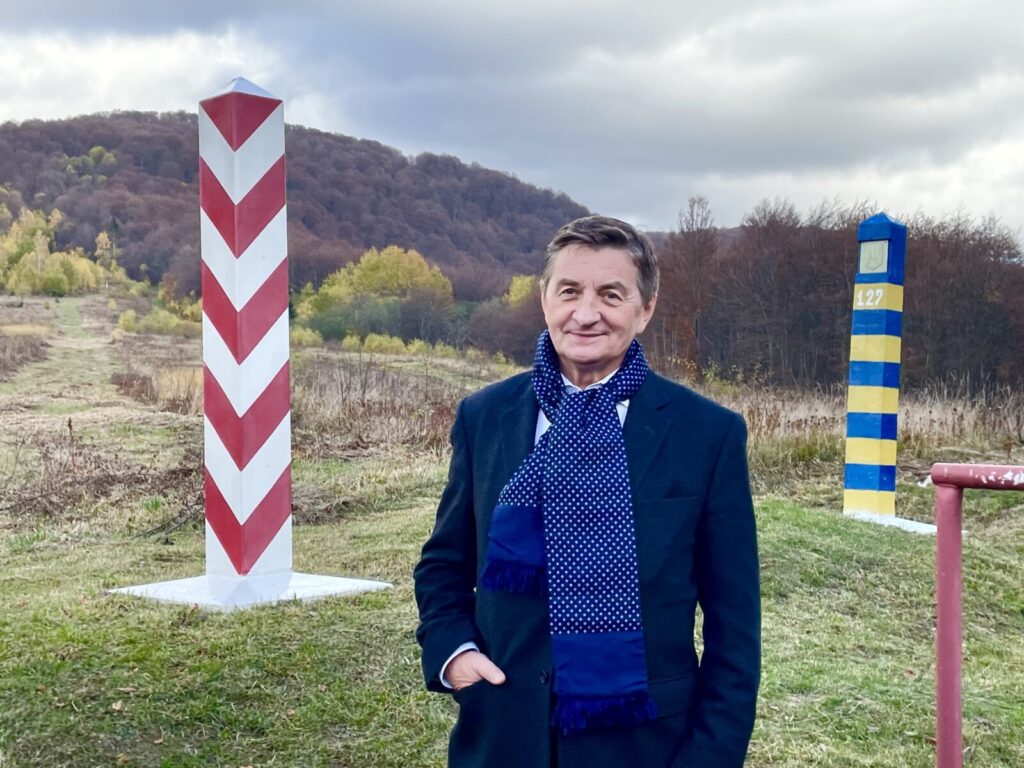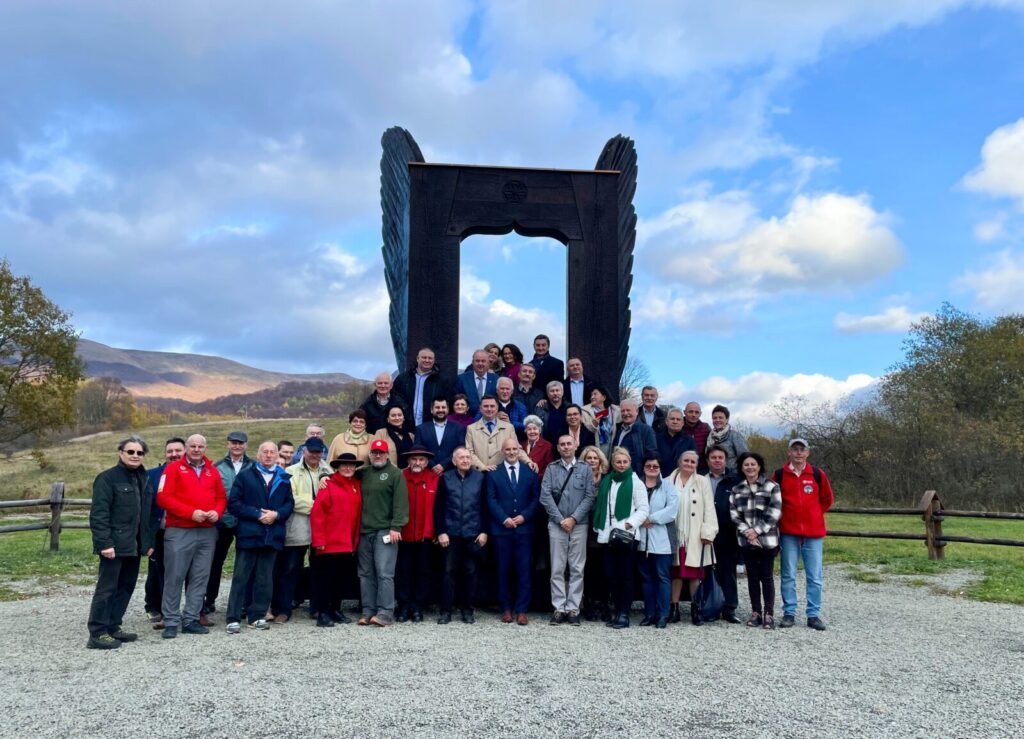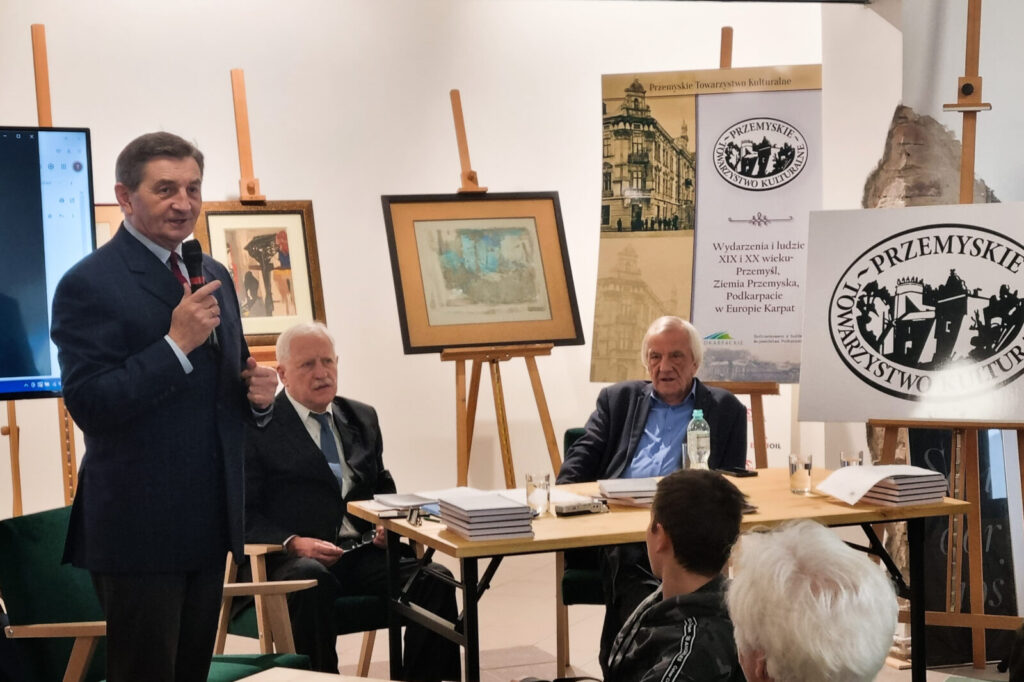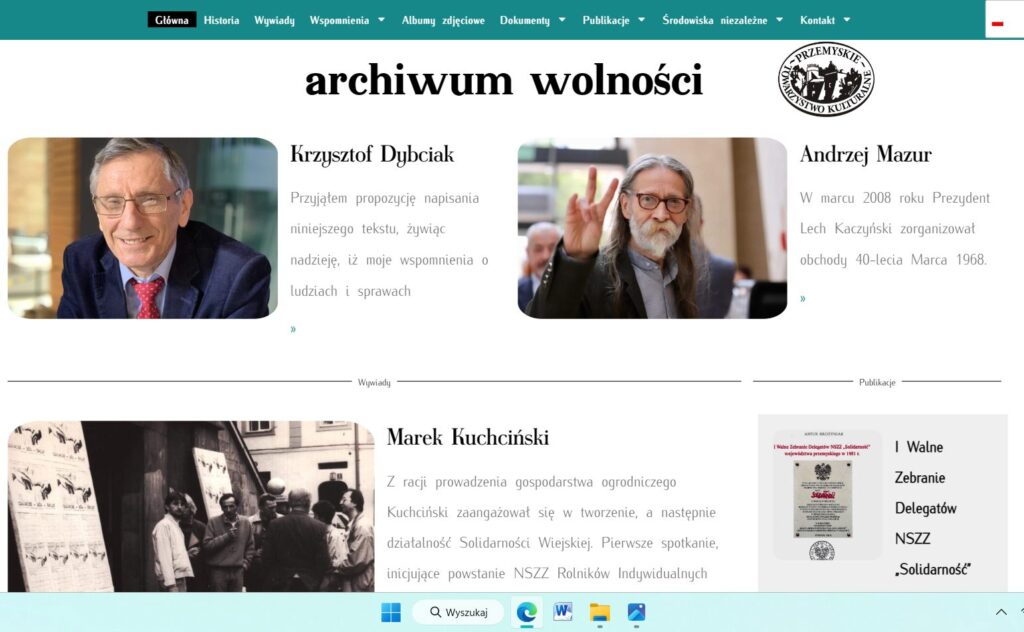2022 is the reactivation of the Przemyśl Cultural Society, which integrates and activates the Podkarpacie community around topics close to politics, literature, culture, environment and tourism. PTK organized seven conferences in the series: "Events and people of the 19th and 20th centuries - Przemyśl, Przemyśl Land and Podkarpacie in Europe of the Carpathians"whose attendance proves that the project hit the jackpot.
The conferences, apart from enriching knowledge, served to create ideas and discuss what should be done so that such an unusual corner preserves its unique nature and traditions, but also catches up with other areas of our country in terms of development. What can be done to make the Carpathians as popular as the Alps, the inhabitants to profit from tourism, and the Carpathian products to be famous for their quality and originality.
The meetings brought the region closer as an intriguing, interesting, diverse land, a land where many cultures meet, the richness of species, the potential of the centuries-old neighborhood of Carpathian societies and the rich culture of mountainous regions is the result of the crossing of influences of the East and the West, common experiences of history, as well as folk and pastoral traditions.
I
May. Krasiczyn.
The PTK panel, which took place as part of the Europe of the Carpathians conference, was devoted to the importance of individual countries, lands and regions in building the identity of Central Europe. The role of the Przemyśl Land and Podkarpacie in the Europe of the Carpathians is discussed. Among other things, about how, in times of confrontation of cultures, Carpathian diversity builds the identity of Central and Eastern Europe. – We are driven by a great goal to make this area the best place to live in the EU by the 22nd century. To achieve this, we should by 2050, make the area of Europe of the Carpathians the best place to live in Europe, said Marek Kuchciński.
The Carpathians should be well connected, and thoughts should permeate each other. Good communication saves time, but also knowledge and development. The Old Continent must unite in the face of challenges posed by threats - it is worth looking at this part of Europe also through the prism of Russia's aspirations, the need to stabilize the region and strengthen NATO's eastern flank. We are working on strengthening Carpathian cooperation and a strategy that, following the example of the Alpine or Baltic ones, will help protect nature and develop this wonderful region. This is a great opportunity that we cannot waste. The first conference in the series developed these issues, focusing the panellists' attention mainly on trails and roads, such as Via Carpatia, because communication is a huge factor in development and safety.
II
July. Yew.
The theme of the meeting was the cultural and natural heritage of Podkarpacie on the example of the achievements of, among others, Jan Gwalbert Pawlikowski and Jerzy Piórecki, introduced by the director of the Arboretum Narcyz Piórecki and the President of the Society of Friends of Science Waldemar Wiglusz, as well as images of the Carpathians in the works of outstanding figures, including Stanisław Vincenz, Kazimierz Wierzyński and St. John Paul II, which was presented by prof. Krzysztof Dybciak.
The special guest of the conference was the Minister of Education, Przemysław Czarnek, who argued that in the era of anti-Christian cultural and social revolution, providing children and youth with a true vision of man, his roles in society, his nature, including information about his sexuality in the context of love between people, appears to be as necessary to save and pass on to the next generations the achievements and foundations of the Latin, Christian civilization.
– When it comes to the common good of society, it cannot be separated from the specific cultural heritage. The word 'heritage', however, describes both something present today and its origin in history. Yes, we inherit certain ways of cultivating the common good - this makes us, for example, Poles, not Germans or Russians. We, Poles, have in our heritage the rich culture of the Republic of Poland - both in the long history of the First Republic of Poland and in the much shorter, but so important, history that ran through the 19th century and new independence, then extremely hard times of war and enslavement, up to the Third Republic and our day, said the minister.
III
July. Pacławska Calvary.
The conference was devoted to outstanding people of the Church and the influence they had on shaping social attitudes and strengthening the system of values in Central Europe. The lecture was given by prof. Włodzimierz Bernacki, Dr. Imre Molnár from Hungary, Dr. Jan Musiał and the guardian Fr. Krzysztof Hura.
– This whole envelope, this series of various initiatives, ideas and circles that took place in the great movement of Solidarity, here in Przemyśl, is a bit blurred. I think we should continue this work. It is also important to think about the future, that is to recall the lives of outstanding, forgotten or underestimated figures who, like Archbishop Ignacy Tokarczuk, Fr. Wenanty Katarzyniec and János Esterházy shaped moral attitudes in Central Europe. Our part of Europe is a great intellectual wealth and the strength that faith gives us. It's a tradition we're proud to keep. We need authorities, love, respect, humility, justice, building bonds. We need hope. That is why we return to the story of people who are moral guideposts, said Marek Kuchciński.
IV
September. Myczkowce.
In the vicinity of the breathtaking Solina, the speakers shared curiosities in the field of geology, talked about the pioneers of tourism, health resorts, folk beliefs, herbal medicine, and vegetarian cuisine. The host of the meeting, the president of PTK Marek Kuchciński, who himself grew herbs and eco-vegetables during the communism, emphasized that combining so many topics will certainly bring a positive effect, because one stems from the other, and together they create an important collection of natural, cultural and geological biodiversity of the Carpathians. According to the head of the Chancellery of the Prime Minister, the extraordinary natural values of the Carpathians should be the basis for the development of health resorts. He also reminded that there are about 45 spa communes in Poland, and over a dozen in mountainous areas. It is safe to assume that there could be three times as many of them. The more that we have pre-war traditions.
Prof. Mariusz Orion Jędrysek began his tour of the Carpathians by traveling millions of years back, when today's structures of the globe were being formed. According to Professor, the Carpathians, which are the cradle of the entire oil industry in the world, have a huge potential for the extraction of energy resources - about 2 trillion m3 of gas (in our part), which would be enough for at least a hundred years of our needs. However, the wealth of deposits is not only oil or gas. The Carpathians are also great resources of gravels, sands and thermal waters, which gives great opportunities for the development of health resorts. Also a geologist, Dr. Leszek Jankowski spoke e.g. about the morphological diversity, the geotourism potential of the Carpathians and how the rocks "behave". An interesting fact presented by Dr. Jankowski are the deposits of... amber found in the Carpathians.
We rose from the ground to the top, because Dr. Dariusz Dyląg introduced the audience to the history of Carpathian tourism. The guests could see the floristic notes of hikers, fragments of old newspapers, graphics, photographs of women in long elegant dresses hiking in the mountains, legal documents, as well as less "serious" ones, such as instructions for making a backpack.
Dr. Bernadetta Bienia devoted her lecture to the beneficial properties of herbs - medicines, spices, essential oils - and introduced it with a quote from the Book of Psalms: "You make grass grow for cattle and herbs to serve man." In the old days, the difficult mountain terrain isolated from doctors, which prompted the natives to collect herbs - in the meadows, deep in the forest, but also grown in their own gardens. A handy first aid kit consisted of herbs, and plants considered today as weeds were also used. – We have moved away from nature, but we are coming back little by little and we should come back. This is our heritage – she concluded the lecture.
Natalia Tarkowska referred to the date of the conference - the date of the symbol - September 17, 1939, when the Soviet army entered Poland, the Ministry of Military Affairs with the commander-in-chief of the Armed Forces, Edward Rydz-Śmigły, was accommodated in the clinic of Dr Apolinary Tarnawski in Kosów Huculski. The history of the clinic is extraordinary, and the lecture, due to the short time, left me unsatisfied. Is it possible to combine natural medicine with patriotism? Tarnawski's idea was to heal the nation, tired of the partitions. This backwater of Poland was visited by the fathers of independence: Roman Dmowski, Ignacy Daszyński and Wojciech Korfanty. In the valley of the Rybnica River there was an unusual microclimate, supporting the healing, sometimes unconventional, methods of Dr. Tarnawski. The pioneer of natural medicine considered them a salvation from human misery. He believed that civilization had destroyed man. You have to stop to regain your lost instincts and also your independence. His method, shocking and even outrageous for many - the waking sounds of gongs, slaloms between trees and barefoot runs in the dew - drew on movement and the gifts of nature.
V
October. Musical.
The leading theme of the conference was cooperation for the sustainable development of the Carpathian region in the scope of the Carpathian Convention and the possibility of developing tourism in the region by creating tourist border crossings, with respect for nature. An open letter of the participants on the opening of the Łubnia-Wołosate border crossing was also read out.
– We met in Muczne, in the heart of the Bieszczady Mountains, to discuss the potential of the Carpathians. We look at them as one common land, which should be ensured development, but preserving this extraordinary natural wealth, beautiful landscapes, taking care of clean water and air. The countries of the Carpathian Belt face a challenge: how to reconcile the pursuit of the most developed in Europe with the need resulting not only from the regulations in force, but also the natural one - to live close to nature and respect the environment - said Marek Kuchciński. The Marshal referred to the green philosophy of Roger Scruton, who believed that conservatism has much greater predispositions than liberalism or socialism to face problems related to ecology. Our common future is uncertain, but we can choose a path that will keep our planet and our species safe. No large-scale project will succeed if it is not rooted in small-scale practical reasoning. So we need to take control of our environment and take care of it as if it were our home, including by being active in local associations, which has been a traditional goal of politics.
– For over 20 years, we have been formulating demands for the construction of new border crossings with Ukraine, and only now we are starting the construction of Malhowice. Already then, we talked about pedestrian and bicycle crossings, tourist crossings in Roztocze, Bieszczady, and around Kalwaria Pacławska to facilitate pilgrimage traffic. We also talked about restoring the route that stretches from Romania to the UK. For many years, new crossings have also been postulated: Żurawin-Boberka in the Lutowiska commune and Bystre-Łopuszanka in the Czarna commune, expansion and enabling a freight crossing in Krościenko - said Marek Kuchciński. For comparison, he compared the number of crossings on the Polish-German border: 45 and the Polish-Ukrainian border: 9. - For the flow of people and goods, it is definitely not enough. Their greater number would make it easier and would strengthen Ukraine's Western choice, and it also pays off for us. Data from 2019 show that those driving 100 km into our country left PLN 7.6 billion, mostly running retail trade, which translates into tens of thousands of jobs.
According to Minister Małgorzata Golińska, the wealth that attracts the Carpathians should be preserved, and the aesthetics of the landscape should not be destroyed by billboards, advertisements and posters. She also argued that the government is able to conduct investments with respect for nature, but we do not boast about the natural heritage too much, and there is too little awareness of it abroad.
The Marshal of the Podkarpackie Voivodeship, Władysław Ortyl, pointed out that the Carpathian regions are economically very poorly developed, which is why another development strategy, similar to the Alpine one, is so much needed. A strategy that also includes the Carpathian regions of Ukraine would not only be an important development impulse for these areas, but also a form of cooperation integrating and strengthening the eastern and external border of the European Union and Ukraine itself. On the other hand, intensifying cooperation in the Carpathian macroregion would significantly contribute to the reconstruction of Ukraine and its faster integration with the EU.
Deputy Marshal of the voivodeship Piotr Pilch stressed that we have had very good years for road investments in the Bieszczady, resulting, for example, in the section Ustrzyki Dolne - Lutowiska, the area around Solina Lake, and from the Polanczyk Ład are granted funds for the section Polańczyk - Wilkowyja. Work is also advanced on connecting the Green Velo from Przemyśl through Arłamow, Ustrzyki Dolne, Ustrzyki Górne to Cisna.
VI and VI
November. Industry.
The conference was devoted to Polish-Hungarian relations in the Przemyśl region as well as education and schooling between Lviv and Krakow.
- We invite outstanding people who have an impact on today's public life in our country, and more broadly, we reach into the past, but with the thought of drawing wisdom for the future - said Kuchciński. - Looking from the perspective of centuries, Przemyśl is a sentimental center for many nations and cultures of Central Europe, we decided that we will end this cycle with the participation of our Hungarian friends - added the former marshal. He also announced that in the government, following in the footsteps of Hungarians training in the Polish language, it was decided to educate several dozen state officials in the Hungarian language. During the second part of the meeting, which took place in the new seat of PTK, Marek Kuchciński reminded that it is also the former seat of the Society and the first seat of the Przemyśl Citizens' Committee, as well as the room that was given to the Empik club after the breakthrough. – It was here that Jarosław Kaczyński led the founding meeting. History has come full circle, but we don't just want to remember, we also want to learn from it. We are guided by concern for our roots, and not only family ones, but history, the history of Poland and our own homelands, and this very turbulent and difficult history, but at the same time showing the great characters of heroes, the heroic deeds of entire groups of people, because we were talking about military units here - said the head of the Chancellery of the Prime Minister.
During the first panel: "Participation of Hungarians in the social, political and cultural life of the Przemyśl Land (19th - 20th centuries). Przemyśl – a city of many cultures. Everyday life in former Przemyśl” with the participation of speakers: prof. István Kovács, prof. Csaby Gyorgy Kissa, dr. Imre Molnár, prof. dr. hab. Jan Draus, Dr. Lucjan Fac and dr. Tomasz Pomykacz, it was emphasized that Przemyśl can be treated as a Visegrad common place of remembrance. This is the place where Hungarian soldiers rest - 60 percent. The Przemyśl Fortress consisted of Hungarian units, here a common life was vibrant, literature and newspapers were published in German, Hungarian and Polish, where, in addition to current information, historical articles, news from abroad and poems were published, including Gézy Gyóni, who was captured and died in Russia. Services were held for the Hungarians in the garrison church, cultural life developed, an orchestra played, important railway lines crossed. Przemyśl still exists in the Hungarian consciousness, there are still organized trips along the trail of WWI cemeteries to educate the youngest generations and preserve the memory of their ancestors, the more so that during the communist era the tradition of the First World War was forgotten.
The second panel, with the participation of the Deputy Speaker of the Sejm prof. dr. hab. Ryszard Terlecki and Dr. Jan Musiał was titled: "Between Lviv and Krakow. Education and schooling in Przemyśl - from the Jesuit College to PWSW in Przemyśl. It discusses the history of education, which largely owes its development to the Church - the Jesuit and Piarist orders - and later, including the dramatic fate of professors of the universities in Krakow and Lviv, the death of outstanding scientists from the hands of Germans in Lviv or Krakow professors caught in a trap during World War II, the consequence of which was a concentration camp, as well as further persecution by the Stalinist authorities, arrests and careers subordinated to the system.
In 2022, the Przemyśl Cultural Society also launched the Archives of Freedom portal (Archive of Freedom - Przemyśl Land and Region 1967-1997 (archiwumwolnosci.pl)) devoted to the memories of oppositionists and collecting materials from the years 1967 - 1997.
